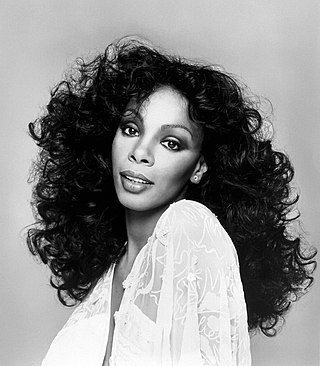
Donna Adrian Gaines, known professionally as Donna Summer, was an American singer and songwriter. She gained prominence during the disco era of the 1970s and became known as the "Queen of Disco", while her music gained a global following.

"MacArthur Park" is a song written by American singer-songwriter Jimmy Webb that was recorded first by Irish actor and singer Richard Harris in 1968. Harris's version peaked at number two on the Billboard Hot 100 chart and number four on the UK Singles Chart. "MacArthur Park" was subsequently covered by numerous artists, including a 1970 Grammy-winning version by country music singer Waylon Jennings and a number one Billboard Hot 100 disco arrangement by Donna Summer in 1978. Webb won the 1969 Grammy Award for Best Arrangement Accompanying Vocalist(s) for the Richard Harris version.
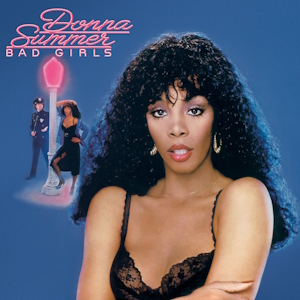
Bad Girls is the seventh studio album by American singer-songwriter Donna Summer. It was released on April 25, 1979, by Casablanca Records. Originally issued as a double album, Bad Girls became the best-selling and most critically acclaimed album of Summer's career. It was also her final studio album for Casablanca Records. In 2003, Universal Music re-issued Bad Girls as a digitally remastered and expanded deluxe edition.
Roberta Kelly is an American disco and urban contemporary gospel singer who scored three hits on the US Billboard Hot Dance Music/Club Play chart between 1976 and 1978. Her most successful US hit single, "Trouble-Maker", spent two weeks at No. 1.
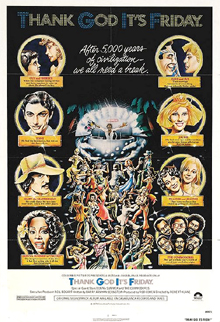
Thank God It's Friday is a 1978 American musical-comedy film directed by Robert Klane and produced by Motown Productions and Casablanca FilmWorks for Columbia Pictures. Produced at the height of the disco craze, the film features The Commodores performing "Too Hot ta Trot", and Donna Summer performing "Last Dance", which won the Academy Award for Best Original Song in 1978. The film features an early performance by Jeff Goldblum and the first major screen appearance by Debra Winger. The film also features Terri Nunn, who later achieved fame in the 1980s new wave group Berlin. This was one of several Columbia Pictures films in which the studio's "Torch Lady" came to life in the opening credits, showing off her moves for a few seconds before the start of the film.

"I Feel Love" is a song by the American singer Donna Summer. Produced and co-written by Giorgio Moroder and Pete Bellotte, it was recorded for Summer's fifth studio album, I Remember Yesterday (1977). The album concept was to have each track evoke a different musical decade; for "I Feel Love", the team aimed to create a futuristic mood, employing a Moog synthesizer.

Live and More is the first live album recorded by American singer-songwriter Donna Summer, and it was her second double album, released on August 28, 1978 by Casablanca Records. The live concert featured on the first three sides of this double album was recorded in the Universal Amphitheater, Los Angeles, California in 1978.

Paul Frederick Jabara, was an American actor, singer, and songwriter. He was born to a Lebanese family in Brooklyn, New York. He wrote Donna Summer's Oscar-winning "Last Dance" from Thank God It's Friday (1978), as well as "No More Tears ", Summer's international hit duet with Barbra Streisand. He also co-wrote the Weather Girls' iconic hit "It's Raining Men" with Paul Shaffer.

"Hot Stuff" is a song by American singer Donna Summer from her seventh studio album Bad Girls (1979), produced by English producer Pete Bellotte and Italian producer Giorgio Moroder and released as the lead single from Bad Girls in 1979 through Casablanca Records. Up to that point, Summer had mainly been associated with disco songs but this song also showed a significant rock direction, including a guitar solo by ex-Doobie Brother and Steely Dan guitarist Jeff "Skunk" Baxter. It is the second of four songs by Summer to reach number one on the Billboard Hot 100.

She Works Hard for the Money is the eleventh studio album by American singer Donna Summer, released on June 13, 1983, by Mercury Records. It was her most successful studio album of the decade, peaking at No. 9 on the Billboard 200 and its title track became one of the biggest hits of her career and her biggest hit of the decade, peaking at No. 3 on the Billboard Hot 100.
"If I Can't Have You" is a disco song written by the Bee Gees in 1977. The song initially appeared on the Saturday Night Fever soundtrack in a version by Yvonne Elliman, released in November 1977. The Bee Gees' own version appeared a month later as the B-side of "Stayin' Alive".
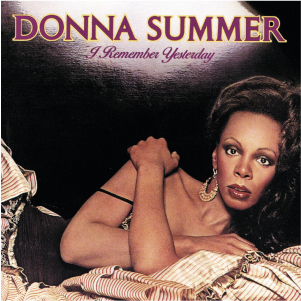
I Remember Yesterday is the fifth studio album by American singer-songwriter Donna Summer. It was released on May 13, 1977, seven months after the release of her previous album. Like her previous three albums, it was a concept album, this time seeing Summer combining the recent disco sound with various sounds of the past. I Remember Yesterday includes the singles "Can't We Just Sit Down ", "I Feel Love", the title track, "Love's Unkind" and "Back in Love Again". "I Feel Love" and "Love's Unkind" proved to be the album's most popular and enduring hits, the former of which came to be one of Summer's signature songs.

"No More Tears (Enough Is Enough)" is a 1979 song recorded by American singers Barbra Streisand and Donna Summer. It was written by Paul Jabara and Bruce Roberts, and produced by Giorgio Moroder and Gary Klein. The song was recorded for Streisand's Wet album and also as a new track for Summer's compilation double album On the Radio: Greatest Hits Volumes I & II. The full-length version was found on Streisand's album, while a longer 11-minute edit (the 12" version) was featured on Summer's album. The longer 12" version features additional production by frequent collaborator Harold Faltermeyer, and incorporates a harder rock edge.

Once Upon a Time is the sixth studio album by American singer-songwriter Donna Summer. It was released on October 31, 1977, and peaked at No. 26 on the US Billboard 200, number thirteen on the Top R&B/Hip-Hop Albums chart and No. 24 on the UK Albums Chart. The entire album charted as one entry at No. 1 on the Hot Dance/Disco chart. Once Upon a Time includes the singles "I Love You", "Fairy Tale High", "Once Upon a Time" and "Rumour Has It". The album did not spawn a hit single as popular as "I Feel Love".

On the Radio: Greatest Hits Volumes I & II is the first greatest hits album by American singer Donna Summer, released on October 15, 1979. It was her fourth consecutive double album, and also made her the first person ever to take three consecutive double albums to the number one spot on the U.S. album chart. This would become Summer's third multi-platinum album to date.

"Dim All the Lights" is a song by American recording artist Donna Summer released as the third single from her 1979 album Bad Girls. It debuted at number 70 on August 25, 1979, and peaked that year at number two on November 10 and November 17 on the Billboard Hot 100. Produced by her longtime collaborator Giorgio Moroder with Pete Bellotte, the track combines Summer's trademark disco beats with a more soulful pop sound. It was the third Hot 100 top-two single from the album and her sixth consecutive Hot 100 top-five single.

The Ultimate Collection is a greatest hits three-CD compilation of recordings by American singer Donna Summer released in the Netherlands in early 2003.
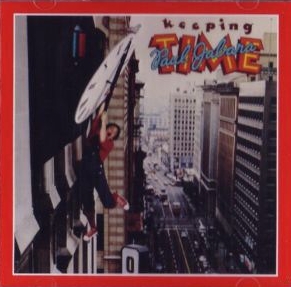
Keeping Time is the second studio album by American actor, singer and songwriter Paul Jabara.

Foxes is the soundtrack to the 1980 film of the same name, starring Jodie Foster, Scott Baio, Sally Kellerman, Randy Quaid as well as The Runaways' lead singer Cherie Currie. The double-album was released on the disco label Casablanca Records.

















